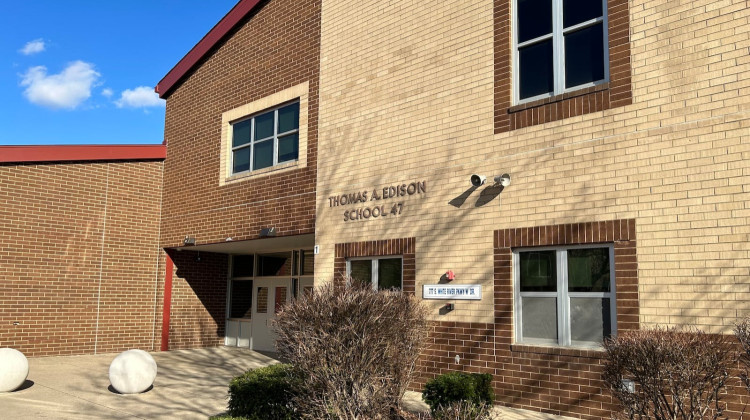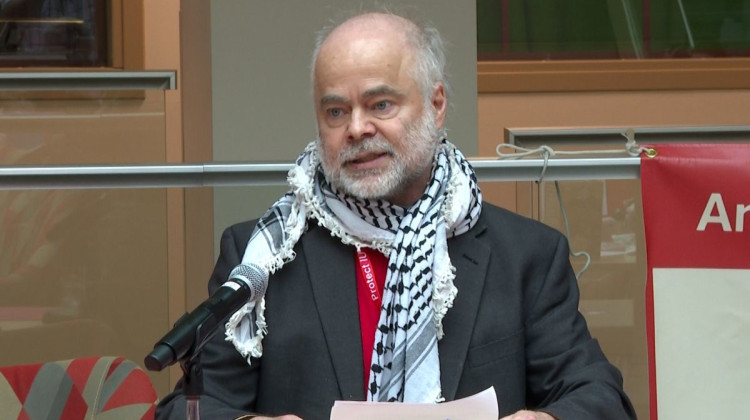
Campaign signs for two at-large candidates for the Indianapolis Public Schools Board of Commissioners near Shortridge High School on Sunday, Nov. 1, 2020.
Eric Weddle/WFYI NewsA majority of seats are on the ballot for the Indianapolis Public Schools Board of Commissioners, making this a potentially pivotal election for the district.
Depending on who wins, according to candidates and their supporters, an ideological tilt on the seven-member board could lead to drastically different outcomes.
In one outcome, most members may agree the district should continue to collaborate with outside groups and charter organizations to improve failing schools.
In another ramification, there could be a dramatic shift away from charters and other outside collaborations, a different take on reform. In this scenario the district could return to more traditional methods of improving struggling schools and clash with the current administration’s reform goals.
That ideological divide is drawing huge sums of money to the race -- expected to exceed a half-million dollars with most of it going to four candidates -- to cover advertising on social media, cell phone texting campaigns and support staff. There’s also been public fighting among some candidates and their supporters, with accusations of political smears and campaign finance violations.
Here’s a look at what is making this election the most contentious in recent memory.
The Stakes
Depending on who you ask, the stakes in this school board election are drastically different, but all candidates agree the goal is the same: Provide the best education to the city’s mostly Black and Brown students.
“On the big picture, democracy is at stake, to be honest,” said Dountonia Batts, a board member of the Indiana Coalition for Public Education, a group critical to many reforms that swept Indiana education policy in the past decade.
Batts, who lives in Indianapolis, argues that the district’s fast-paced adoption of innovation schools -- district schools operated by charter organizations and nonprofit school managers -- is happening in spite of parental concern, or even awareness.
“The ability to hold your school accountable for its successes and failures, to have a voice in how your school is run, to have direct access to your school board - that is all at stake,” Batts said.
MORE: Want To Know Where IPS School Board Candidates Stand? Check Our Voter Guide
Innovation schools and the connected charter school partnerships are at the heart of the debate among board candidates and their supporters. All four seats up for election have a candidate on either side of debate over whether or not this is the preferred model to improve the district.
One use of the innovation model by district leaders is to turn around failing schools by removing leadership at particular schools then partnering with charter organizations for management and oversight. The school board retains authority to end the partnership. Teachers at these schools are not part of the district's union contract.
Last week, the district reported student enrollment at innovation schools increased by 37 percent, to around 11,600 students. Just five years ago, innovation enrollment made up 4.5 percent of students.
Batts and those who oppose reform through outside partnerships argue innovation schools are an “illusion of choice” for families.
Families and teachers protested when the school board narrowly approved innovation conversions at Louis B. Russell Jr. School 48 earlier this year and at Frederick Douglass SUPER School 19 in 2018.
Batts said some don’t want the transition to happen to their neighborhood school, yet they are still stuck attending it. Those on this side of the argument want the district to put more effort and resources into struggling schools, rather than restarting them as innovation schools.
“We are bamboozling the community with words, laced in equity and choice and all these other words that make it feel like we're a part of the conversation,” Batts said. “When indeed, the conversation is being discussed without our input, or even being invited to the table.”
But Justin Ohlemiller, executive director of Stand for Children Indiana, said time’s up to keep trying old methods to fix failing schools. Stand for Children Indiana supported the innovation model since the state legislature approved it in 2015.
Less than 10 years ago, he said, the IPS School Board would respond to the concerns of mostly white families from affluent parts of the city. Now, Ohlemiller said, more families are part of the conversation.
“(Stand For Children) really wanted to focus on bringing more voices to the table,” “Especially parents in underserved communities have typically been left out of the process that have typically not been getting kind of a fair shake,” Ohlemiller said.
Stand For Children Indiana endorsed four candidates who support the ongoing reforms -- two incumbents, one candidate for the open District 1 seat and a challenger in the at-large race.
“There are thousands of Black and Brown students who just simply do not have the same opportunities as their more white, affluent peers. That's true in IPS,” said Ohlemiller, who also included other districts in Marion County. “So, you know, the question is, why is that, and what do you do about it?”
Ohlemiller has led campaigns with parents to demand their neighborhood schools get a new curriculum or become innovation schools. Yet he warns innovation schools are not a “silver bullet” for education.
Rather, he said, the current school board’s focus on racial equity will be a guide to positive changes -- if that stays the board’s focus after the election -- such as, it could make sure highly qualified teachers are placed where they are needed and use data to find disparities.
Ohlemiller doesn’t question the other side’s dedication to equity, but asks if they would take steps to address it no matter where inequity is found. He points to Louis B. Russell Jr. School 48 - a school now operated by Phalen Leadership Academy.
“You have board members who basically said, ‘don't change the principal, don't change the approach. Let's give this another year,” he said of two commissioners not on this year’s ballot who voted against the restart. “This is after seven years of low performance, right, for almost a decade of children not getting an equitable, fair shot at quality education.”
The Fights
As the pandemic limited the traditional door-to-door campaigning, most candidates turned their efforts to Facebook and other social media platforms.
Candidates held their own live events to answer questions and took part in local podcasts, radio shows and forums intended to dig into issues, like one presented by Chalkbeat Indiana and WFYI. And sometimes that virtual realm turned into a battlefield of accusations and arguments.
District 4 incumbent Diane Arnold and challenger Christina Smith are two who clash regularly.
Arnold has said Smith would “rather continue to see our most vulnerable students fail academically” then consider new ways of operating schools. Arnold also recently labeled Smith as following “the Trump agenda with lies” and “misinformation.”
Smith has shared info-graphics of Arnold’s past board board votes, including her approval to close high schools and make staff layoffs during her 14 years as a board member. In one post, she ties Arnold to the district’s graduation rate, currently 75 percent -- a 16 point difference from the state average.
In the four-way race for the at-large seat, candidates tended toward a different approach. Rather than disparage each other, incumbent Elizabeth Gore and challenger Kenneth Allen rolled out a series of powerful endorsements to attract votes.
On social media, Gore shared an endorsement by Pat Payne, one of the city’s most revered crusaders for equity. Payne, nearing her 60th year at IPS, is the director of the district’s Racial Equity Institute.
Over the weekend, voters received text messages from Indianapolis Councillor Maggie Lewis urging support of Allen because he will do “what’s best for our students and families.”
Ellis Noto and Kendra McKnight are also running for the at-large seat.
The issue of how campaigns are funded has lead to supporters on both sides raising concerns.
Last week, Brandon Brown publicly questioned if Facebook campaign ads by IPS Community Coalition, a group critical of district reforms, were following campaign law. Brown is CEO of The Mind Trust, a district partner for innovation schools and reform support.
Following Brown's post, the coalition announced it indeed broke campaign finance law by not reporting $296.92 spent on Facebook ads. The group said it corrected the mistake and formed a political action committee.
The Money
Many are wondering how much money will eventually be spent on the IPS school board race as the total reported through candidate finance reports is around $430,000.
So far, around $285,000 has been given by three political action committees to aid four candidates who support innovation schools and charter collaborations. The PACs for Indy Chamber, RISE Indy and Stand for Children Indiana gave direct and in-kind support to District 1 candidate Will Pritchard, District 2 incumbent Venita Moore, District 4 incumbent Diane Arnold and at-large challenger Kenneth Allen.
On the side critical of the continued reform through innovation schools, candidates endorsed by the Indiana Coalition for Public Education and IPS Community Coalition raised around $40,000: District 1 candidate Brandon Randall, District 2 challenger Daqavise Winston, District 4 challenger Christina Smith and at-large incumbent Elizabeth Gore. The bulk of this money includes a total of $30,000 from I-PACE, the political action committee of the Indiana State Teachers Association to Randall, Smith and Gore.
The two other at-large candidates -- Noto and McKnight -- have not filed campaign finance reports.
The influx of outside money in the IPS board race is not new. It began eight years ago when reforms gained traction in the district and resulted in candidates breaking district fundraising records.
In past elections, Stand did not disclose its political spending because it operated a 501(c)(4) organization and was not legally required to. So far this election, Stand PAC spent at least $140,000 on the IPS race, according to campaign finance reports.
The money spent this cycle, Ohlemiller said, is because the stakes are so high for children in the city. The presidential election has drawn the attention of voters and his organization is spending to drive some attention back to IPS.
“It takes time and resources, and effort to get an electorate engaged, that is typically not looking at these elections, or these races,” he said. “We believe, and I think the parents that we work with believe, that these are some of the most important jobs in our community.”
RISE Indy PAC, a new education advocacy group, reported taking in $559,595 in its pre-election campaign report. Of that, more than $100,000 was spent on the IPS school board races, according to campaign filings. The PAC also reported $55,881 for campaign mailers and $105,000 for digital advertising.
RISE’s major individual contributions include two national advocates for the expansion of charter schools: Alice Walton, a daughter of Walmart founder Sam Walton, gave $200,000, and former Mayor of New York City Michael R. Bloomberg donated $100,000. Bloomberg donated in IPS board races previously.
The new Hoosiers for Great Public Schools PAC, chaired by former Indianapolis Democrat mayor Bart Peterson, also gave $200,000 to RISE. Peterson was the first mayor in the country to be given power by a state to authorize charter schools in 2001 and is on the RISE board. He declined an interview with WFYI.
Jasmin Shaheed-Young, president and CEO of RISE Indy also declined in an interview with WFYI about the group’s campaign spending. In a statement about its campaign efforts, Shaheed-Young, said the group “believes in the importance of amplifying community voice to improve outcomes in public education that will strengthen the Indianapolis community.”
But Batts, who is also a member of the IPS Community Coalition, disagrees. She says the large sums of money have long been used by pro-innovation reformers to ensure their preferred candidates stay on the board.
“For them it's important to make sure that the machine continues to function in the way that it was designed to function,” she said. “And so you continue to invest in it, to make sure you get the desired result that you want.”
The general election is Tuesday.
Contact WFYI education reporter Eric Weddle at eweddle@wfyi.org or call (317) 614-0470. Follow on Twitter: @ericweddle.
 DONATE
DONATE






 Support WFYI. We can't do it without you.
Support WFYI. We can't do it without you.